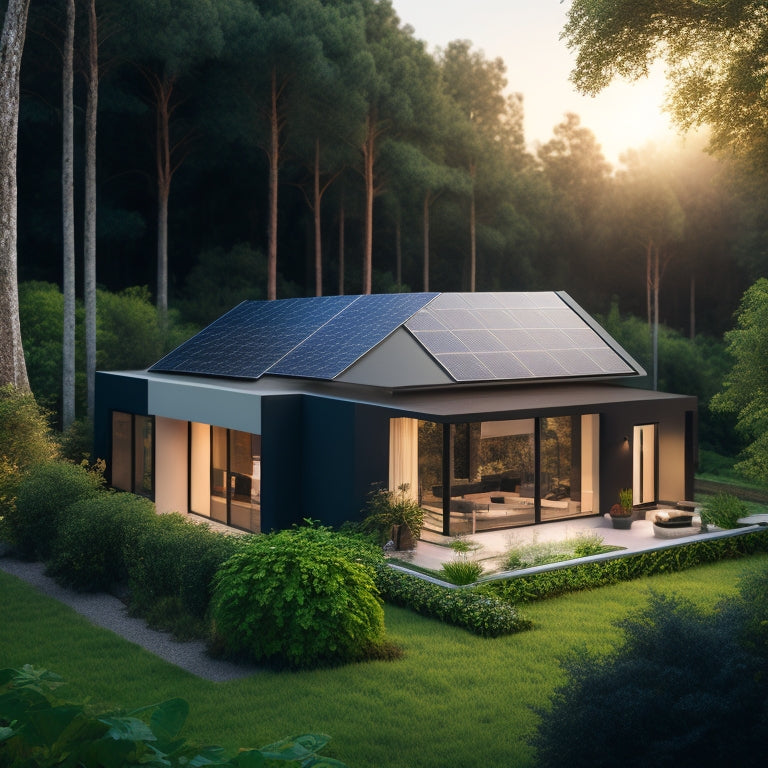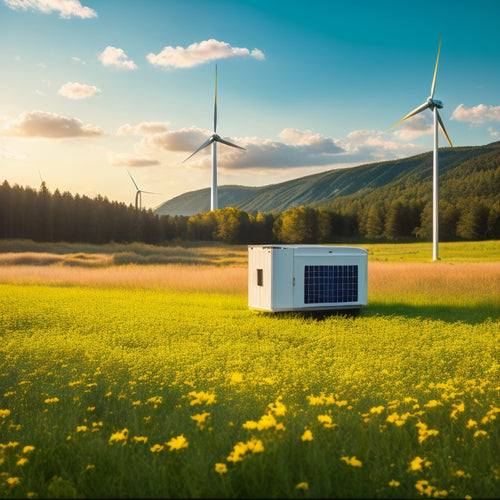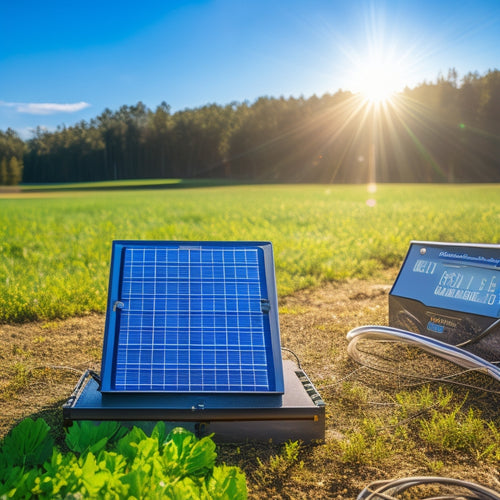
Storing Energy for a Greener Home
Share
You're considering upgrading to a greener home by storing excess energy generated from renewable sources like solar and wind. Energy storage systems provide a reliable backup during power outages, ensuring a stable energy supply when you need it most. You can choose from various home renewable energy storage options, including battery banks, flywheel storage, and compressed air storage, each catering to specific energy needs and goals. Solar battery storage systems, in particular, allow you to store excess solar energy for nighttime use or during outages, promoting energy independence. By exploring the right energy storage solutions, you'll take an essential step towards a more sustainable and self-sufficient home.
Overview
- Energy storage systems bridge generation and consumption gaps, ensuring a stable energy supply during variable weather and promoting sustainable practices.
- Solar battery systems enable the storage of excess solar energy for nighttime use or during outages, integrating with solar panel installations for energy independence.
- Energy storage provides reliability during power outages, storing energy for periods of low sunlight and ensuring energy resilience and preparedness.
- Decentralized power systems enhance energy resilience, allowing for off-grid solutions and contributing to future-proofing homes with reduced carbon footprint.
- Energy storage guarantees energy autonomy, supporting sustainable living practices and reducing reliance on traditional fossil fuels or public utilities.
Home Renewable Energy Storage Options
As you increasingly rely on renewable energy sources to power your home, you'll likely find yourself wrestling with the issue of energy storage. This is because renewable energy sources like solar and wind power are intermittent, meaning they're not always available when you need them.
By selecting the appropriate battery size and technology Battery Technology and Selection, you can guarantee that you're storing excess energy efficiently and effectively. To guarantee energy efficiency and sustainable practices, you'll need a reliable way to store excess energy for later use.
Home renewable energy storage options include battery banks, flywheel energy storage, and compressed air energy storage. Each has its own advantages and disadvantages, and the right choice for you'll depend on your specific energy needs and goals.
Solar Battery Storage Systems
One of the most popular home renewable energy storage options is a solar battery storage system, which enables you to store excess energy generated by your solar panels during the day for use at night or during power outages. This system integrates seamlessly with your solar panel integration, allowing you to maximize your energy independence. With a solar battery storage system, you can enjoy the benefits of renewable energy while reducing your reliance on the grid.
| Feature | Benefit |
|---|---|
| High battery efficiency | Maximizes stored energy capacity |
| Scalable design | Accommodates increasing energy demands |
| Advanced monitoring | Tracks energy usage and storage in real-time |
| Long-lasting batteries | Reduces maintenance and replacement costs |
Energy Storage for Backup Power
You'll want a reliable energy storage system to make certain your home remains powered during outages, and that's where energy storage for backup power comes in.
With a well-designed backup system, you'll have protection from power outages and the peace of mind that comes with energy independence.
In fact, solar-powered battery backup systems store excess energy for use during outages or low sunlight, and they can even provide backup power for critical infrastructure and essential services.
Power Outage Protection
During extended power outages, your energy independence can be severely compromised, leaving you reliant on traditional fossil fuels or public utilities. However, with energy storage for backup power, you can guarantee energy resilience and outage preparedness. This means you'll have emergency planning in place, assuring power reliability and home safety.
| Benefits | Features |
|---|---|
| Energy Assurance | Backup Capacity for Critical Loads |
| Grid Independence | Renewable Integration for Sustainable Solutions |
| Home Safety | Automatic Switching during Outages |
| Power Reliability | Reliable Backup Power during Emergency |
| Sustainable Solutions | Reduced Carbon Footprint with Energy Storage |
Reliable Backup Systems
By integrating energy storage into your backup power system, you can guarantee a seamless shift to reliable backup power in the event of an outage, thereby minimizing disruptions to your daily routine.
Hybrid systems that combine energy storage with grid integration promote energy efficiency and smart management. When selecting a reliable backup system, consider cost considerations, installation options, and maintenance tips to secure peak performance.
Look for systems with proven battery longevity and system compatibility, such as those offered by Tesla Powerwall key brands for battery backup systems.
It's also essential to assess your power needs and choose the right battery capacity to match your calculated power requirements. Performance metrics, such as response time and power output, should also be evaluated.
Energy Independence Guaranteed
With energy storage integrated into your backup power system, you're guaranteed a seamless shift to reliable backup power in the event of an outage, thereby minimizing disruptions to your daily routine. This means you'll enjoy energy autonomy, sustainable living, and self-sufficiency strategies that guarantee your home remains powered and comfortable.
| Benefits | Features | Advantages |
|---|---|---|
| Renewable Independence | Decentralized Power | Energy Resilience |
| Off Grid Solutions | Energy Storage Systems | Future Proofing Homes |
| Eco-Friendly Practices | Energy Management Systems | Reduced Carbon Footprint |
Green Home Energy Storage Solutions
You're likely considering energy storage systems that can efficiently store excess energy generated by your renewable power sources, such as solar or wind power.
A well-designed energy storage system guarantees a steady supply of electricity during power outages or when the grid is down.
Energy Storage Systems
Energy storage systems play an essential role in optimizing your green home's energy efficiency by bridging the gap between energy generation and consumption.
By storing excess energy generated by your solar panels or wind turbines, you can use it when you need it most, reducing your reliance on the grid. This not only saves you money but also enables you to participate in smart grids, where energy is shared and distributed efficiently.
With energy storage systems, you can guarantee a stable and consistent energy supply, even when the sun isn't shining or the wind isn't blowing.
Renewable Power Backup
Your green home's renewable power backup system serves as a safeguard against unpredictable weather patterns and grid outages, guaranteeing a reliable supply of clean energy when you need it most.
This system integrates seamlessly with your energy management system, allowing you to optimize energy usage and reduce reliance on the grid.
During periods of high energy demand or grid outages, your renewable power backup system kicks in, providing a seamless shift to clean energy. This guarantees that your home remains powered, even when the grid is down.
With grid integration, you can also feed excess energy back into the grid, offsetting your energy costs and increasing your energy independence.
Off-Grid Energy Storage Systems
Off-grid energy storage systems are designed to provide a reliable source of power when the grid is unavailable, making them an attractive option for homeowners seeking autonomy and reduced reliance on public utilities.
You'll enjoy the off-grid benefits of energy security and reduced environmental impact. These sustainable solutions often involve system integration with renewable energy sources like solar or wind power.
When considering an off-grid system, you'll need to conduct a cost analysis and weigh it against the maintenance considerations.
Fortunately, technology advancements have made these systems more efficient and user-friendly. However, you may face installation challenges, so it's crucial to research and carefully plan your system.
Renewable Energy Storage Technologies
Several innovative renewable energy storage technologies are emerging to efficiently capture and store power from sustainable sources.
As you investigate these options, you'll find that hydrogen storage is becoming increasingly popular. This technology involves converting excess energy into hydrogen gas, which can then be stored for later use in fuel cells or internal combustion engines.
Another promising technology is thermal energy storage, which involves heating or cooling materials to store energy for later use in heating or cooling your home.
These technologies offer a reliable and efficient way to store renewable energy, giving you more freedom to power your home sustainably.
Frequently Asked Questions
How Long Does It Take to Install a Home Energy Storage System?
You'll typically spend 1-3 days installing a home energy storage system, depending on the system size and complexity, with the installation timeline varying from a few hours for a small setup to several days for a larger one.
Are Energy Storage Systems Compatible With Existing Solar Panels?
You'll be pleased to know that most energy storage systems are designed to be compatible with existing solar panels, offering flexible energy storage options that can seamlessly integrate with your current setup, ensuring a harmonious and efficient energy solution.
Can I Use Energy Storage for My Electric Vehicle Charging?
You can optimize your electric vehicle charging by pairing it with energy storage, enhancing charging efficiency and reducing strain on the grid, especially with high-capacity batteries that can store excess energy for later use.
Do Energy Storage Systems Require Regular Maintenance?
You'll be surprised to know that 80% of energy storage system failures are preventable with regular maintenance. To enhance your battery lifespan, you'll need to perform routine checks, which can help reduce maintenance costs and guarantee peak performance.
Are There Government Incentives for Energy Storage System Installations?
You can benefit from government incentives for energy storage system installations, including federal tax credits, state rebates, and incentive programs, which can help finance your project and increase energy efficiency with renewable energy solutions.
Ready to Buy
As you consider storing energy for a greener home, it's no coincidence that the options align with your values. You're not only reducing reliance on the grid, but also mitigating climate change. By choosing solar battery storage systems, energy storage for backup power, or off-grid energy storage systems, you're investing in a sustainable future. Coincidentally, these solutions also provide energy independence and cost savings. It's a win-win for you and the planet.
Related Posts
-

Is This the Future of Alternative Energy Systems
Yes, alternative energy systems are shaping the future of energy. Innovations in solar and wind technologies are driv...
-

Sustainable and Eco-Friendly Generators for a Reduced Carbon Footprint
Sustainable and eco-friendly generators are perfect for cutting your carbon footprint and increasing energy efficienc...
-

Choosing the Right Solar Power Charge Controller
Choosing the right solar power charge controller is crucial for maximizing energy efficiency and extending battery li...


